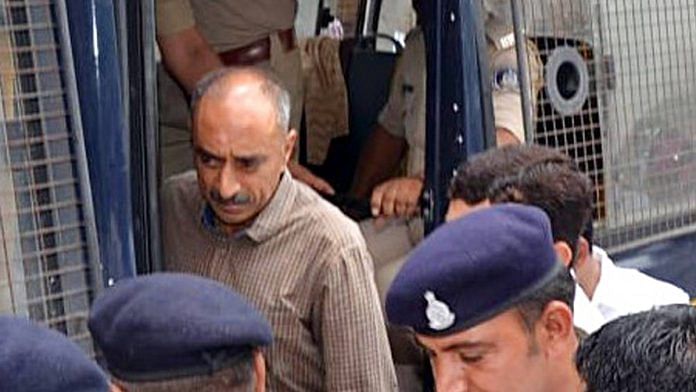New Delhi: A court in Banaskantha district of Gujarat Thursday sentenced former Indian Police Service (IPS) officer Sanjiv Bhatt to 20 years in jail in a 1996 drug planting case.
According to the judgment, originally in Gujarati, the allegations in this case date back to the time when Bhatt was serving as the Banaskantha superintendent of police.
He has now been held guilty of falsely implicating Sumer Singh Rajpurohit, a Rajasthan-based lawyer, by planting commercial quantities of opium in a hotel room. Rajpurohit was arrested and he alleged that a property occupied by him was vacated under the pressure of his implication in this case.
The court has now convicted Bhatt under various provisions of the Narcotic Drugs and Psychotropic Substances (NDPS) Act, and the Indian Penal Code.
In January, the Gujarat High Court had upheld the life sentence and murder conviction of Bhatt in a 1990 case of alleged custodial torture and death. He was convicted and sentenced to life imprisonment in June 2019 by a Jamnagar sessions court in this case.
How will the two sentences run? Additional Sessions Judge J.N. Thakkar answered the question in Thursday’s judgment.
“Presently, the accused Mr Sanjiv Bhatt is serving the sentence for the offence under Section 302 (punishment for murder) of the Indian Penal Code. The sentence for that offence and the sentence imposed in the present judgment are ordered to be served by the accused consecutively, i.e. after the completion of the sentence for one offence, the sentence for the other offence is to be served,” the court observed.
What does life imprisonment mean, and how will the 20-year sentence run after it? ThePrint explains.
Also Read: Army launches probe into Poonch civilian deaths and torture videos, commanders likely to be replaced
What is life imprisonment?
There is a misconception that a prisoner serving a life sentence has an indefeasible right to be released after completion of either 14 years or 20 years’ imprisonment. The Supreme Court took note of this misconception in a landmark judgment passed in 2012.
It then explained: “A convict undergoing life imprisonment is expected to remain in custody till the end of his life, subject to any remission granted by the appropriate government.”
The court clarified that the prisoner has no “indefeasible right to release on completion of either 14 years or 20 years’ imprisonment”.
Section 432 of the Code of Criminal Procedure (CrPC) permits the appropriate government, which may be the Union and the state, to “remit” a person’s sentence. Remission means reducing the amount of sentence without changing its character, e.g. two years’ rigorous imprisonment to one-year rigorous imprisonment.
Section 433A of the CrPC places a restriction on powers of remission. It says that where a person has been given a life sentence, for a crime which has death penalty as one of the punishments, then such a person shall not be released unless he has served at least 14 years in jail.
State governments set up a Sentence Review Board to exercise the powers of remission.
How will the sentences run?
Now, the trial court judge in the NDPS case against Bhatt has ordered that the 20-year sentence would run consecutively, after the earlier sentence in the custodial death case.
Delhi-based criminal lawyer Sarim Naved explained: “Right now, he (Bhatt) is not serving this sentence, he is serving his life imprisonment sentence. He will start serving this sentence when the other sentence is deemed to have been completed.”
This completion, he said, can come from a remission, or a pardon, or if his life term sentence is reduced or overturned by the higher courts.
This power of granting remission is different from constitutional powers enjoyed by the President and the Governor. Articles 72 and 161 of the Constitution empower the President and the Governors to grant pardons or to suspend, remit or commute sentences in certain cases.
“If he stays in jail till life actually, then the other sentence won’t apply,” Naved added.
(Edited by Nida Fatima Siddiqui)
Also Read: Row over ‘custodial torture death’ in Telangana. ‘Thrashed, forced to give wrong custody dates’



